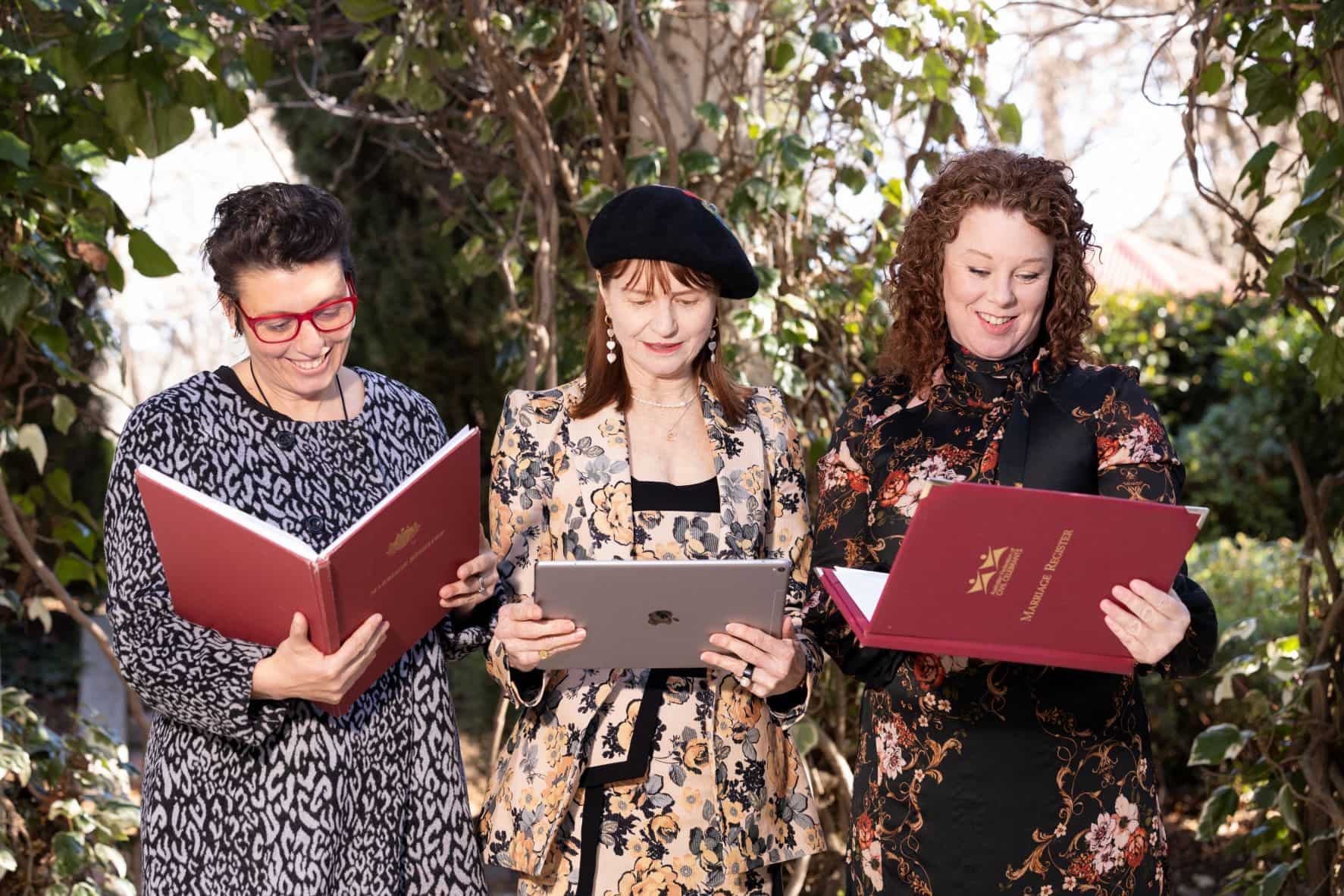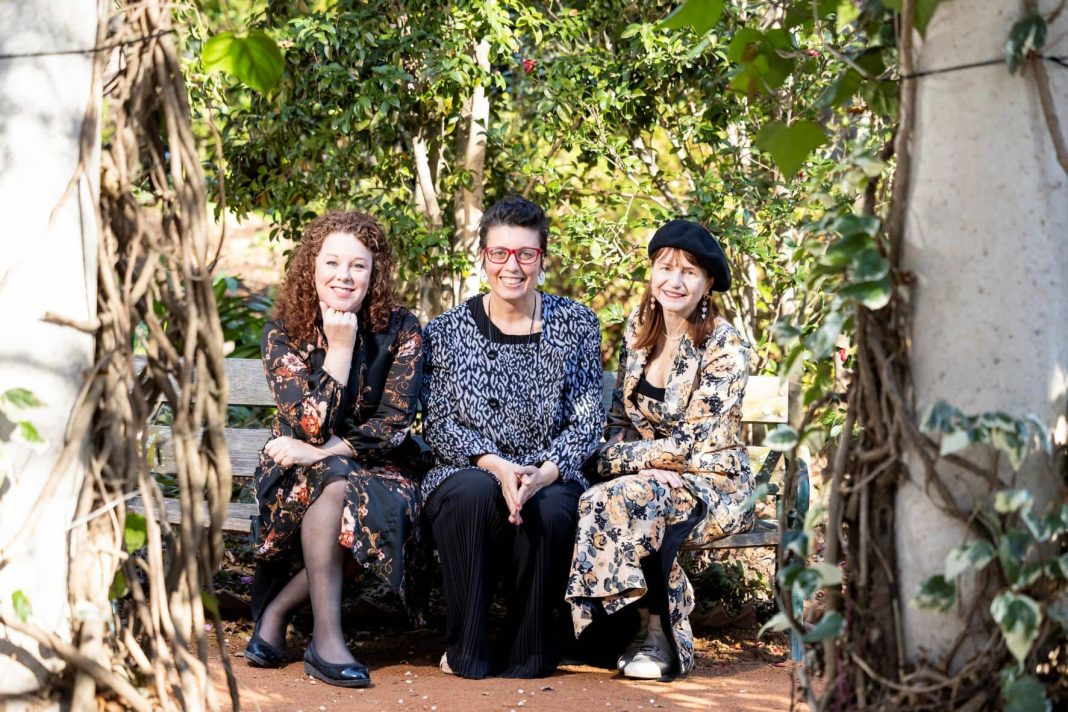Something old, something blue, something sustainable? Canberra celebrants say the newest wedding craze is good for the environment.
There’s been a push towards more sustainable weddings, according to three Canberra celebrants – Tanya Losanno, Julie Rattenbury and Elena Forato. The women agreed it coincided with the Covid-19 pandemic; couples have been more conscious of the costs that start to pile up when planning a wedding. They say when things are simpler, they also tend to be more sustainable.
“I think that sustainability is the new trend, but because of climate change and the way that people think about things, it’s here to stay,” Tanya said.
Tanya remembers attending a friend’s wedding years ago and being struck by how cool the officiant was. Then, when she gave birth to her second child, she decided to do an online celebrancy course. Ten years later, she brings her own hip, cool style to the weddings she officiates around Canberra.
Around six years ago, Tanya received a message from Julie, another local celebrant and the two hit it off instantly. The duo became a trio when Elena attended a celebrancy lunch they hosted around three years ago.
Julie has been officiating weddings for 15 years. She, too, was drawn to the industry after seeing that celebrants didn’t have to fit a particular stereotype. Elena started overseeing weddings after retiring nearly four years ago, as she wanted to give something back to the community; she has been known to forgo her fee on occasion.
“Covid has really helped us all with slimming things back. Same with couples with their weddings; they have peeled everything back to what’s important,” Julie said.
Some of the other things that have fallen by the wayside include balloons, throwing rice and using big cars like Hummers. While more and more couples are sourcing their own wedding favours, one that stuck out was teacup and saucers that had been found while scouring secondhand shops.
Brides and grooms are also getting hands-on and creating decorations like arbors, which can be placed in their gardens after the ceremony. Dried flowers have replaced fresh flowers in a conscious way to reduce the impact on the environment.
“People don’t have things like confetti anymore; they use gum leaves, and they hole punch them or they throw the whole leaf, it’s just as beautiful,” Tanya said.
Weddings can be mostly paperless. During Covid shutdowns, celebrants were given the go-ahead to let clients virtually sign licences. This is due to expire at the end of this year. The actual certificate still needs to be printed and signed; Julie has installed an ecofriendly printer for this.
There has been a drastic decline in the use of animals as props, something the women are grateful for. They mentioned how often the animals died or never returned after the release. Butterflies arrive frozen; they wake up, fly off and die shortly after; the release of live doves and pigeons didn’t fare much better.
“I had one once where they sent out 10 (birds) but six of them didn’t come home and I think if the couple knew that, they wouldn’t do it,” Julie said.

The celebrants have been trying to reduce their footprint on the planet in their own practices, too. Julie invested in a Kobo to read from during her ceremonies two years ago; she praised the device saying she’s only had to charge it once in that time, even though she has officiated over 60 weddings.
“It’s the accumulation of a lot of things across the whole of the industry. We’re one part of it and there are lots of other parts as well. If we can accumulate our contributions, we can make a bigger contribution,” Elena said.
Video software like Zoom allows the celebrants and couples to save time and money on petrol rather than having to meet up in person for each appointment. It has also played an imperative role in weddings during the pandemic, allowing family and friends who couldn’t travel to watch from their own screens.
“One of the best weddings I did in Covid was the couple, two witnesses and their dog. They had everyone on zoom watching and sent everybody a grazing box and a bottle of champagne. That would have saved them thousands of dollars, and everyone was still involved,” Tanya said.
They think this trend will continue as the world re-opens with more people opting to have a few smaller celebrations rather than expecting people to fly to them for one big bash.
“Not so much of ‘it’s my day, come to me’, people are being more mindful of how it affects other people’s lives,” Julie said.
Taking part in so many weddings sees them in a lot of photos. They always have to look presentable, which can take its toll on the earth and the wallet if they are constantly buying new outfits. Instead they turn to buy, sell, and swap groups on Facebook. A celebrant-only group is a place to source outfits and to rehome things like lecterns and speakers. These groups are also becoming increasingly popular with wedding parties to find clothes and decorations.
Elena has always loved fashion; she passes on her knowledge to her clients of which Australian-based brands have the best eco policies. She has even lent her own clothes to brides and their families/friends. Her consulting office contains all ex-government furniture, as Elena is passionate about saving items from landfill.
Tanya has recently purchased an electric car, which she has offered as the arrival car for a friend’s wedding, and plans to offer it to couples in the future. Its main purpose was to allow Tanya to keep traveling for weddings and not having to pass on the rising fuel costs to clients.
Regarding sustainable venues, they agreed we are spoilt for choice here in the Canberra region with many beautiful parks and spaces that can be used for free. They do recommend seeing if you can book ahead. They all love to see the personal touches couples put on the public spaces; Tanya recalled a wedding at Nara Peace Park where a couple brought their own grand piano.
The three women are passionate about sustainability and helping their clients have the perfect day. One thing they have learned in their years on the job is that you are only limited by your imagination.
“You can get married in a hot air balloon, or on top of Gibraltar Falls or on a footy field if that’s what you want,” Julie said.
Get local, national and world news, plus sport, entertainment, lifestyle, competitions and more delivered straight to your inbox with the Canberra Daily Daily Newsletter. Sign up here.



